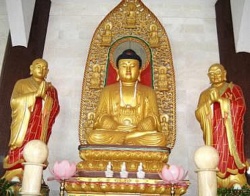Kumarajiva
Kumarajiva
鳩摩羅什 (344–413) (Skt; Jpn Kumaraju)
A Buddhist scholar and a translator of Buddhist scriptures into Chinese. Another account has him living from 350 through 409. His father was Kuma-rayana, the son of a former minister of an Indian kingdom, who had renounced his right to his father's position in order to become a monk.His mother was Jivaka, a younger sister of the king of Kucha in Central Asia. When Kumarajiva was seven years old, his mother renounced secular life and traveled with him to India and several other countries to study Buddhism. As a result, Kumarajiva mastered several languages. He first studied Hinayana Buddhism and later received instruction in the Mahayana teachings from Shuryasoma. When he returned home, he spread Mahayana Buddhism, and his reputation became known as far away as China.
In 382 Fu Chien, ruler of the Former Ch'in dynasty, ordered General Ly Kuang and his army to invade Kucha and other countries, and to bring Kumarajiva back to Ch'ang-an, the dynastic capital. Ly Kuang took Kumarajiva prisoner but on the way back learned of the fall of the Former Ch'in dynasty. He decided to remain in Liang-chou, where he held Kumarajiva for some sixteen years. Finally, however, Kumarajiva made his way to Ch'ang-an in 401 at the invitation of Yao Hsing, ruler of the Later Ch'in dynasty.
There he was given the position of teacher of the nation and immersed himself in the translation of Buddhist scriptures.According to A Collection of Records concerning the Tripitaka, he translated 35 works in 294 volumes, accomplishing this in a mere ten years. Prominent among his translations were those of the Lotus Sutra, the Larger Wisdom Sutra, the Smaller Wisdom Sutra, the Vimalakirti Sutra, the Benevolent Kings Sutra, the Amida Sutra, The Ten Divisions of Monastic Rules, The Treatise on the Great Perfection of Wisdom, The Treatise on the Middle Way, The One-Hundred-Verse Treatise, The Treatise on the Twelve Gates, and The Treatise on the Establishment of Truth. Prized by later generations for their excellence and clarity, Kumarajiva's translations profoundly influenced the subsequent development of Buddhism in China and Japan. Kumarajiva also fostered many disciples, more than three thousand by some accounts.
